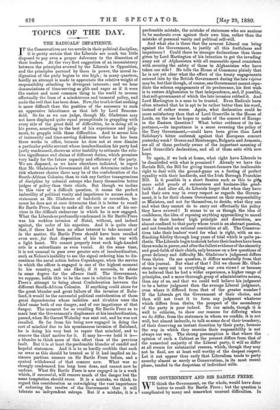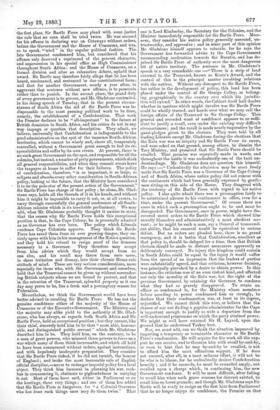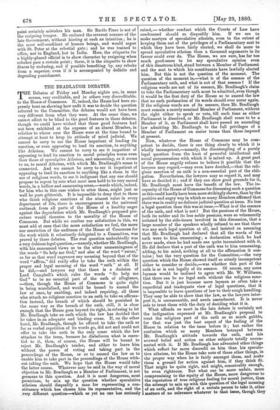THE GOVERNMENT .AND SIR BARTLE }WWI.
WE think the Government, on the whole, would have done better to recall Sir Bartle Frere ; but the question is complicated by many and somewhat unusual difficulties. In the first place, Sir Bartle Frere may plead with some justice the rule that no man shall be tried twice. He was accused for his offence in declaring war on Cetewayo without orders, before the Government and the House of Commons, and was, so to speak, " tried " in the regular political fashion. The late Government condemned him, but considered that his ' offence only deserved a reprimand of the gravest character, and supersession in his special office as High Commissioner throughout South Africa ; and the House of Commons, on a formal division and after an exhaustive debate, upheld that award. Sir Bartle may therefore fairly allege that he has been heard, condemned, and sentenced in due constitutional form; and that for another Government, nearly a year after, to aggravate that sentence without new offence, is to persecute rather than to punish. In the second place, the grand duty of every government is to govern, and Mr. Gladstone contended, in his strong speech of Tuesday, that in the present circum- stances of South Africa the aid of Sir Bartle Frere was in- dispensable to the most pressing political work to be done, namely, the establishment of a Confederation. That work the Premier declares to be " all-important " to the future of British dominion in South Africa, and his critics do not in any way impugn or question that description. They admit, we believe universally that Confederation is indispensable to the good administration on the spot of the immense South-African territories, which cannot be wisely and, above all, temperately controlled, without a Government great enough to feel its re- 'sponsibilities and suffer by its own errors. At present, there is no such great Government on the spot, and responsible for all the colonies, but instead, a number of petty governments, which shirk all general responsibilities, and when they commit errors leave the taxpayer at home to suffer for their failures. The policy of confederation therefore, "is so important, is so large, so eclipses and absorbs every other consideration in South-African policy, looking to the future, that the Ministry have considered
• it to be the pole-star of the present action of the Government." Sir Bartle Frere has charge of that policy ; he alone, Mr. Glad- stone says, holds all the threads of it in his hands, and without him it might be impossible to carry it out, or, at all events, to carry through successfully the general conference of all South- African colonies which is its inevitable preliminary. • We may add, what Mr. Gladstone probably thought it unwise to state, that the reason why Sir Bartle Frere holds this exceptional position is that, in the Cape Colony, he is personally admired as no Governor has ever been. The policy which Liberals condemn Cape Colonists approve. They think Sir Bartle Frere has saved them from an ever growing danger, they en- tirely agree with him in his management of the Native question, and they hold his refusal to resign proof of the firmness necessary to a Governor. They therefore may accept from him advice which they would accept from no one else, and his recall may throw them once more, in sheer irritation and dismay, into their chronic Home-rule attitude of mind. These are very serious considerations, more especially for those who, with the Government and ourselves, hold that the Transvaal cannot be given up without surrender- ing British subjects whom we are bound to protect, and that in the retention of the Transvaal, splendid property as it one day may prove to be, lies a fresh and a peremptory reason for Federation.
Nevertheless, we think the Government would have been better advised in recalling Sir Bartle Frere. He has not the genuine confidence either of the majority of the House of Commons or of the Executive Government. The Ministry and the majority may alike yield to the authority of Mr. Glad- stone, who has always, as regards both South Africa and Sir Bartle Frere, held an exceptional position ; but they cannot, like their chief, sincerely hold him to be that "moat able, honour- able, and distinguished public servant" which Mr. Gladstone described him to be. They hold him on the contrary, to be a man of great powers, who misused those powers to force on a war which many of them think inexcusable, and which all hold to have been commenced without orders, against instructions, and with hopelessly inadequate preparation. They consider that Sir Bartle Frere risked, if he did not tarnish, the honour of England ; and broke the most inexorable rule of English official discipline,—never to endanger imperial policy for a local object. They think him immoral in planning his war, reck- less in commencing it, obstinate to pigheadedness in carrying it out. Most of them have said, either in Parliament or on the hustings, these very things ; and one of them has added that Sir Bartle Frere is dangerous, for "a Colonial Governor who has done such things once may do them twice." That one is Lord Kimberley, the Secretary for the Colonies, and the Minister immediately responsible for Sir Bartle Frere. More- over, they consider his native policy generally unsound, un- trustworthy, and oppressive ; and in some part of this opinion Mr. Gladstone himself appears to coincide, for he says the Government has forwarded advice to the Cape Government recommending moderation towards the Basutos, and has de prived Sir Bartle Frere of authority over the most dangerous bit of native territory. The sentence in Mr. Gladstone's
speech is a very remarkable one There is a strip of land external to the Transvaal, known as Keats's Award, and the control of this is the principal matter involving relations with the natives. Without any disrespect to Sir Bartle Frere, but rather in the development of policy, this land has been placed under the control of Sir George Colley, as belong- ing geographically to the country over which his jurisdic- tion will extend." In other words, the Cabinet itself half doubts whether in matters which might involve war Sir Bartle Frers. could be wholly trusted, and hands over what we may call the foreign affairs of the Transvaal to Sir George Colley. This general and recorded want of confidence appears to us suffi cient to justify a recall, even under the existing very difficult circumstances ; and the recall is made nearly imperative by the quasi-pledges given to the electors. They were told by all leading Liberals except Mr. Gladstone during the elections that the Zulu war was an iniquity and Sir Bartle Frere its cause, and were asked on that ground, among others, to dismiss the Tory Ministry, and promised that Sir Bartle Frere should be recalled. That promise was repeatedly made in words, and throughout the battle it was undoubtedly-one of the tacit un- derstandings. Mr. Gladstone does not question this himself: He says :—" Undoubtedly the admission may be most freely made that Sir Bartle Frere was a Governor of the Cape Colony and of South Africa, whose native policy did not concur with the sentiments which had been generally expressed by gentle- men sitting on this side of the House. They disagreed with the tendency of Sir Bartle Frere with regard to his native policy. I also quite admit there was a presumption fairly to. be entertained adverse to his continuance in office, even for a time, under the present Government." Of course there are cases in which such a presumption ought to be and must be disregarded. The Government, once in power, might have dis- covered secret orders to Sir Bartle Frere which showed hinr. morally blameless and administratively a most obedient ser- vant; or he might be such a man, say a General of transcend= ent ability, that his removal would be equivalent to serious defeat. But no orders are pleaded here, there is no grand emergency, and it is better that Confederation, excellent as that policy is, should be delayed for a time, than that British electors should be made to distrust assurances apparently so deliberately conveyed. No injury this kingdom could sustain in South Africa could be equal to the injury it would suffer from the spread of an impression that the leaders of parties were substantially agreed, and that criticism, however decisive, was principally provoked by a desire to obtain power. In thia. instance, the criticism was of an even violent kind, and affected:. not only the morality of the Zulu war, but the right-of the previous Government, by retaining the Governor, to condone. what they had so gravely disapproved. To retain an. officer so condemned is, for the Ministry whose members, before acceding to power condemned him so strongly, to.
declare that their condemnation was, at least in its degree, unjustified. We cannot think this wise, or believe that the chance of our not finding a popular administrator for the Cape is important enough to justify so wide a departure from the well-understood programme on which the party attained power. We might as well have retained Sir H. Layard, upon the ground that he understood Turkey best.
Nor, we must add, can we think the situation improved by imparting a temporary or terminable character to Sir Bartle Frere's condonation. He will require for his work all the sup-
port he can receive, and to threaten him with recall by-and-by, or even to hint that he may by-and-by be recalled, is not
to afford him the most efficacious support. If he does
not succeed, after all, in a most arduous effort, it will not be he who is to blame, for he undoubtedly desires Confederation
heartily ; and if he succeeds, he must be rewarded amply, not recalled upon a charge which, in continuing him, the new Government condones. It will be most difficult, after failing
to recall him when such grave reasons for distrust existed, to recall him on lower grounds; and though Mr. Gladstone says Sir Bartle will be ready to resign on the first hint from Parliament that he no longer enjoys its confidence, the Premier on %hat point certainly mistakes his man. Sir Bartle Frere is not of the resigning temper. He endured the severest censure of the late Government, without hinting at such an intention ; he is the most self-confident of human beings, and would argue with St. Peter at the celestial gate ; and he was trained to office, not in England, but in India. Here, the etiquette for a highly-placed official is to show character by resigning when rebukes pass a certain point ; there, it is the etiquette to show fitness by enduring, and if possible benefiting by, any rebuke from a superior, even if it is accompanied by definite and degrading punishment.




































 Previous page
Previous page